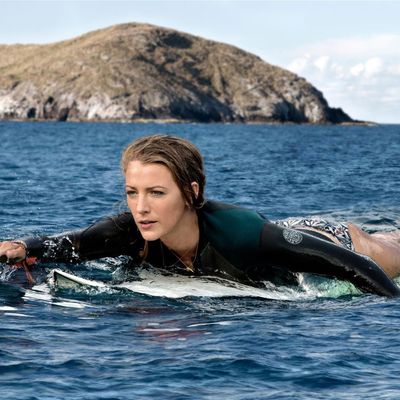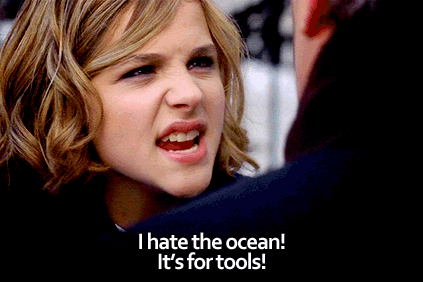
I like Blake Lively, and, as a rule, I support her career choices. If she wants to, say, explore the Age of Adaline’s extended universe, or make a third Sisterhood of the Traveling Pants movie where they’ve all grown old and share one good pair of elastic-waist slacks, great! I’m all for it. What I cannot condone, however, is her new movie, The Shallows, in which she plays a surfer marooned on a rock going toe-to-toe with a shark.
That is because The Shallows is the absolute worst type of movie: a sea movie.
For my purposes, shark movies count as a subset of sea movies, as do boat movies, iceberg movies, tidal wave movies, and castaway movies. As a rule, I have little patience for films about an individual “versus” some natural phenomenon (space, a mountain, bad weather, the woods, etc). I assume people enjoy these films because they like to imagine themselves performing heroic feats in a disaster scenario, but I always leave feeling exhausted, numb, and secure in my knowledge that I would be the first of my friends to die in any survival-type situation.
I have not seen The Shallows, not because it’s bad (apparently the bird acting is pretty good) but because I have principles, one of which is that I refuse to watch a movie where the main antagonist is “the sea.” The sea is not a character. The sea is just a formless void from which to throw random horrors at your protagonist. Here’s what happens to the protagonists of sea movies: They sweat, they grunt, they curse the heavens, they make tortured facial expressions, and they look wet. I’m sure Blake Lively looks great wet — and people have made movies out of less! — but I will not be bamboozled into watching a sea movie on that basis.
Aesthetically, there is nothing more tedious, grueling, and existentially numbing than being visually assaulted by an endless expanse of waves for two-plus hours. Watching a sea movie reminds me a lot of actually being on a boat: You feel nauseous, trapped, simultaneously anxious and bored, and you can’t understand why your boat-friends would ever choose to spend their time like this.
Which is not to say all movies that take place on the sea are bad. The interpersonal dramas of Captain Phillips and Titanic are great, as is the campy fun of Pirates of the Caribbean. Mermaid movies are awesome (more mermaid movies!), as are movies about anthropomorphic fish, because for these characters the sea is just their version of the land. What’s bad about sea movies is any part that requires viewers to have a boating license to understand. This is an excerpt from Wikipedia’s plot description of Robert Redford’s All Is Lost:
When the storm arrives, he runs before the wind. He intends to bring the boat into a hove-to position, but when crawling to the bow to hoist the storm jib, he is thrown overboard and regains the deck after a long struggle. The boat capsizes, turtles after a further 180-degree roll and is dis-masted, and most of the equipment is destroyed. With the boat badly holed and sinking, the man abandons ship in an inflatable life raft, salvaging whatever he can to survive.
And this is from Chris Pine’s The Finest Hours:
Between the Chatham harbor and the open sea lies a bar, a series of shoals that are very dangerous even in good weather. Bernie must time bursts of his engine to ride each approaching wave before it breaks as he pilots the 36500 across the bar. He manages to make it over the bar, though in the process he loses his compass.
Sorry, but these are not plot points. These are lessons in boat maintenance.

Fuck the sea.

